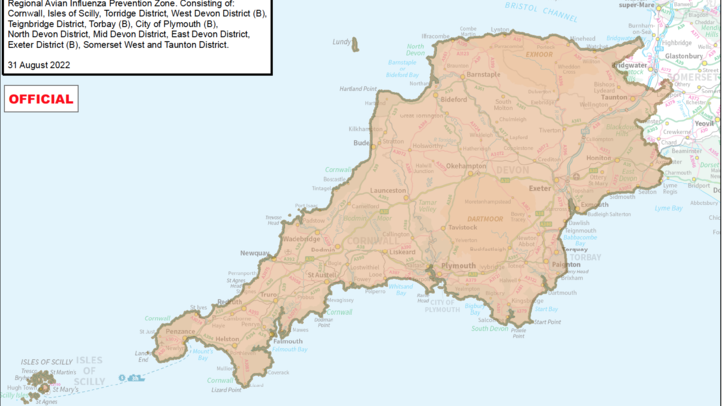The government has declared an Avian Influenza Prevention Zone (AIPZ) in the South West of England following a number of new detections of bird flu in poultry, as well as wild and captive birds in the region.
The affected area covers Devon, Cornwall (including the Isles of Scilly) and parts of Western Somerset. From midday today (August 31), it is now a legal requirement for all bird keepers in in these counties to follow strict biosecurity measures to mitigate the risk of further outbreaks of disease occurring. The prevention zone will remain in place until further notice.
The UK has in recent months faced its largest ever outbreak of bird flu, with over 130 cases confirmed across the country since late October. The introduction of the AIPZ comes after the disease was detected in captive birds at nine premises across the south-west region since last month, as well as several cases in wild seabirds and increased reports of mass mortality in wild birds.
UK deputy chief veterinary officer Richard Irvine said: “Following a number of detections of avian influenza we have declared an Avian Influenza Prevention Zone across Cornwall, Devon and parts of Somerset. This means that all bird keepers in the region must take action now to both prevent disease getting into flocks and it spreading any further.
“Whether you keep just a few birds or thousands, you are now legally required to introduce higher biosecurity standards on your farm or small holding. It is in your interests to do so in order to protect your birds from this highly infectious disease.”
The UK Health Security Agency continue to advise that the risk to public health from the virus is very low and the Food Standards Agency advice remains unchanged, that avian influenzas pose a very low food safety risk for UK consumers.
The AIPZ means bird keepers in the affected region must:
- Cleanse and disinfect clothing, footwear, equipment and vehicles before and after contact with poultry and captive birds – if practical, use disposable protective clothing.
- Reduce the movement of people, vehicles or equipment to and from areas where poultry and captive birds are kept, to minimise contamination from manure, slurry and other products, and use effective vermin control.
- Thoroughly cleanse and disinfect housing on a continuous basis.
- keep fresh disinfectant at the right concentration at all farm and poultry housing entry and exit points.
- Minimise direct and indirect contact between poultry and captive birds and wild birds, including making sure all feed and water is not accessible to wild birds.
- Prevent access by poultry to ponds and watercourses and ensure that birds are kept in fenced or enclosed areas.
Poultry keepers and members of the public should report dead wild birds to Defra’s national dead wild bird helpline on 03459 33 55 77 and keepers should report suspicion of disease in their birds to APHA on 03000 200 301.



